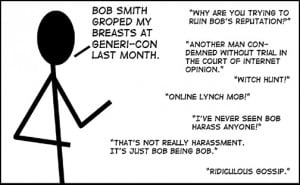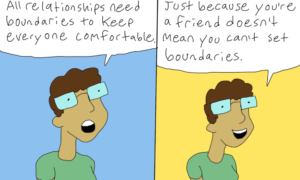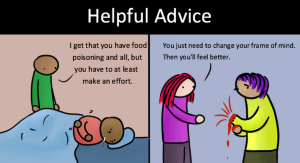Dear White Feminists,
We need to talk.
It’s not just you. It’s not just me, either. It’s all of us.
I know you’re all super-dupes proud of Emma Watson, Taylor Swift, Lorde, Hillary Clinton, Lena Dunham, and your other lily-white modern-day feminist icons, but grrrls, we have to collectively get our shit together when it comes to race and the feminist movement.
I want to help you as best as I can so we can all be a lot more compassionate – and look a lot less ignorant.
As Rosie the Riveter said (except not really), We Can Do It!
Love you – Mean it,
Maddie
A White Feminist™ By Any Other Name
White people hate being lumped together by their whiteness almost as much as they hate being accused of racism. As I type this, I am bracing myself for the fun brand of online commenters who will undoubtedly call me “Racist against white people.”
I get it.
White people aren’t all the same. That kind of thinking is obviously faulty.
However, white people in the feminist movement fall into some problematic behavioral patterns that need to be discussed.
Let me help you feel better. When I talk about problematic feminists who ever-so-happen to be white as winter snow (and/or if their feminism really only helps white people), I will refer to them as White Feminists™, complete with capitalization and the trademark symbol.
That way, you can focus more on the issues at hand than on feeling attacked.
Deal? Deal.
(By the way, this technique is by no means original. Other writers have used the trademark symbol or an asterisk in the White Feminism™ conversation as well as the Nice Guy™ phenomenon, to great reception. Fingers crossed it works for this piece!)
Alright, now that we’ve got that squared away, let’s get this show on the road and talk about what you can do to avoid becoming the dreaded White Feminist™.
Equality Doesn’t Equal Sameness
So many White Feminists™ conflate equality with sameness to white people. Basically, their logic is this: If people of color are equal to white people, then people of color are the same as white people.
Which isn’t exactly accurate. At all.
In fact, I’m going to go ahead and say that assuming that all people of color are equal to white people and therefore the same as white people is actually a fairly colonialist way of thinking.
A White Feminist™ and an intersectional feminist probably both believe that all women of all races deserve equal rights and opportunities. However, the White Feminist™ believes that women being equal means that all women face identical struggles, regardless of racial identity.
Even the historically inaccurate and pretty racially insensitive Disney movie version of Pocahontas pointed out this phenomenon (Stephen Schwartz was just the composer/lyricist and didn’t write the script, but maybe he should have): “You think the only people who are people are the people who look and think like you”
You know the rest of the lyric. It’s in your head now. You’re welcome.
My point is, assimilation is not the equivalent to equality in any context; otherwise, the “Feminists All Wish They Were Men” stereotype would be true. Nope!
I have also met plenty of White Feminists™ who honestly believe that the 1960s Civil Rights Movement in the United States basically “solved” racism, so now everybody is equal and the playing field is level.
If you happen to be a white person (or a person of any race for that matter – I’m looking at you, Raven Symone) who thinks we live in a post-racial time, I’m sure you don’t want to even bring up the topic of race, let alone in the context of feminism.
Some White Feminists™ treat race the way everyone at Hogwarts treated the name “Voldemort.”
Remember, though, that “fear of a name only increases fear of the thing itself.”
Fear of the discussion of race only increases fear of actual racial differences. It’s okay to feel afraid. It’s not okay to discount or exclude others out of fear.
1. Remove Your Blinders
In professional horse races, the four-legged competitors must wear headpieces that block their peripheral vision. These garments, aptly called blinders, prevent the horses from seeing anything other than the finish line directly ahead of them.
Some White Feminists™ seem to take a similar approach to their activism, ignoring the obstacles that people of color face.
Is this behavior executed with malicious intent? I truly don’t think so.
Are the results still problematic and hurtful to people of color? Absolutely.
Don’t you hate it when men try to convince you that your experiences or feelings aren’t valid? That’s kind of like what White Feminists™ do to people of color when they imply that all women’s lives fit the mold of a white experience.
Women of color face adversities specific to being both female and non-white at the same time.
These obstacles are every bit as important as the injustices that White Feminists™ face, but White Feminists™ don’t acknowledge that they exist.
White Feminists™ wear their blinders when they assume that white experiences are universal.
This manifests itself most obviously when white women speak about issues such as street harassment, hate crimes, sexual assault, and the wage gap without even so much as mentioning how these issues specifically impact people of color, especially women of color (I’m talking to you, Patricia Arquette!).
But if you ignore the experiences and needs of women of color to further your own agenda, you’re kinda entirely missing the point of equality for all women.
We at Everyday Feminism believe that impact matters more than intent.
In this case, the actions (and inaction) of White Feminists™ have caused an erasure of people of color within the movement.
Regardless of intent, that is unequivocally not okay.
As I’m sure you can imagine, white privilege plays a central role in White Feminism™’s dismissal of race issues in general. Since white people are not marginalized based on their race, they have the convenient ability to forget to include race in their ideology and work.
I challenge you to take off your White Feminist™ blinders and look outside of the narrow paradigm white privilege has given you.
In layman’s terms: Check your privilege and educate yourself about race issues.
I know my journey in feminism has sometimes led me to believe that the best activist is the one who speaks the loudest; however, part of acknowledging my white privilege has entailed learning when to shut my mouth and fully absorb what activists of color have to say.
This can look like reading works by women of color, researching white supremacy’s effect on the US judicial system, and meeting every buzzy feminist statistic with the question, “But how does this impact women of color?”
It’s easier said than done, and you will make mistakes. I know I have.
You just have to keep listening and acting in solidarity with people of color. If you’re not sure what to do, just continue to listen until the message is clear.
2. Recognize that a Woman of Color Probably Said It First
Feminists of the Internet and beyond: I know we all love to feel recognized for our intellect, wisdom, originality, and/or sass. Those are all great qualities to possess, especially in this movement.
However, if you happen to be a white person – and especially if you happen to be a younger white person like me – just keep in mind that about .0001% of what you have to say is unique.
And that estimation is on the generous side. #SorryNotSorry
Most of the brilliant points you love to make were probably already stated by a person of color. I’d also be willing to bet that the person of color who made intelligent statements way before you did was a woman.
Given the fact that women of color were pioneers of the feminist movement (and, later, the womanist movement) and have pretty much always acted in solidarity with progressive social justice causes, this assertion should not come as a shock to you.
Even the so-called “feminist symbol” originated from the Black Power Movement and was created to be used by women of color.
In fact, I can tell you right now that this hypothesis holds water, because the point I am making in this section has been previously stated by Numerous. Women. Of. Color.
If you think about it, that’s actually an awesome, completely positive thing. You are standing on the shoulders of a diverse force of feminist power that started way before you and will continue after you are gone.
White or not, feminist or not, you have to give credit where credit is due. It’s called being a decent human being.
3. Cultural Appropriation Is So Basic – Stop Doing It
You know that the slang usage of “basic” is only new to white people, right? I’m trying to be meta here. Is it working?
When white people put on affectations from other cultures without understanding their origins, that’s when we get into White Feminist™ Cultural Appropriation territory.
Someone else’s culture is not a costume. I’d like to imagine even the most elementary White Feminist™ understands that.
However, even the most Internet-connected White Feminist™ can still be guilty of cultural appropriation if their appreciation of outside cultures translates into claiming false ownership of traditions of people of color.
We’re supposed to be giving credit where it is due, remember?
Unfortunately, White Feminists™ seem more interested in taking credit for the works and cultures of people of color.
What does this look like?
White Feminist™ Cultural Appropriation is a truly specific brand, because it is so often mistaken for cultural exchange or cultural appreciation.
White Feminist™ Culturally Appropriative behavior includes and is not limited to:
A) Using quotes from prominent people of color without acknowledging their full racial and historical context, like the people who use the Dr. Martin Luther King, Jr. “Darkness cannot drive out darkness” quote to passive-aggressively criticize the riots in Ferguson, Baltimore, and so on.
B) Cherry-picking cultural traditions from people of color – and ultimately bastardizing them with white hippie-dippy-ness.
This includes half-assed quasi-Buddhists (aka rebellious WASPs with Buddha statues in their apartments), festival-goers who take selfies in their bindis and/or headdresses and caption their photos with “Peace, Love, Unity, Respect,” white people who woke up one day and decided it was okay to identify as Two-Spirit, and on and on and on and on.
C) Defending cultural appropriation with an equally bogus excuse. Look, I’m not telling you that your humanitarian work in Africa wasn’t life-changing. I’m just suggesting that you probably shouldn’t get a tattoo of Africa on your pale, freckly shoulder to pay homage.
D) Also, I am so very proud of you for befriending and/or dating one person of color (Seriously, why is it always “one of my best friends is [insert identity here]?” Only one person?!)
However, the more you mention your one very special friend as the anecdote to any racist behavior on your part, the more I start to question the integrity of your friendship.
So, now what?
Maybe your eyes are open to others’ culturally appropriative behavior. Maybe you’ve just vowed to yourself to keep any of your unintentional “Benevolent Racism” in check. That’s a great start.
Most importantly, put down that Urban Outfitters top depicting Ganesha, and examine history outside of your whitewashed high school textbooks.
With actual, self-conducted research (not badgering your one friend of color), you can better understand the significance of other cultures’ traditions.
That significance should hold enough weight to help you recognize how disrespectful it would be to steal from another culture.
4. Get Rid of Your Framework That Says White People Have to Be White Saviors
If you haven’t heard already, the White Savior Industrial Complex is a real thing.
Basically, I’m talking about the phenomenon where white activists feel like it is their duty to “Rescue” communities of color and “Save” them by encouraging them to assimilate into whiteness.
Newsflash: Being a person of color is not an inherent problem, and being a white person is not an inherent solution!
So, what does that mean for you? Well, at this point, I know you don’t want to take on any White Feminist™ behaviors, so repeat after me:
“White does not equal ‘Right.’ I will not perpetuate white supremacy by implying that whiteness is the only or most important way to go through life on this Earth. Also, Maddie McClouskey is super pretty and very good at singing showtunes.”
Okay, maybe that last part was just for me. But you get the general gist, right?
No race has an upper hand on the others.
If you believe that white people are the default (or worse, the superior race), that’s because white supremacy has taught you so.
If you refuse to acknowledge or break down white supremacy, you will forever live in the land of the White Feminist™. End of story.
***
Alright, y’all: This ride is almost over. Before you take off your seatbelts and exit in an orderly fashion, there is one more vital point we at Everyday Feminism would like for you to remember: Whiteness isn’t the problem. White supremacy is.
We’re not telling you that white people shouldn’t be feminists. Everyone should be feminist.
What shouldn’t be going on is the societal idea that whiteness is somehow (arbitrarily) more desirable or important than being a person of color.
That bias permeates our legal and judicial systems and activist movements to this day, and it is downright depressing, not to mention completely wrong.
The White Feminist™ perpetuates white supremacy, but you don’t have to.
[do_widget id=’text-101′]
Maddie McClouskey is a Contributing Writer for Everyday Feminism. She’s a twenty-something lesbian in New York City and currently writes weekly dating advice pieces for the LGBTQ event app and website SheSeekOnline and was a regular contributor to the sexuality and feminism site ToughxCookies. When she’s not writing articles about gayness, she’s performing stand-up comedy, singing show tunes to her girlfriend and dog against their will, or making up jokes for Twitter @SoundofMaddie. Read her articles here.
Search our 3000+ articles!
Read our articles about:
Our online racial justice training
Used by hundreds of universities, non-profits, and businesses.
Click to learn more





















